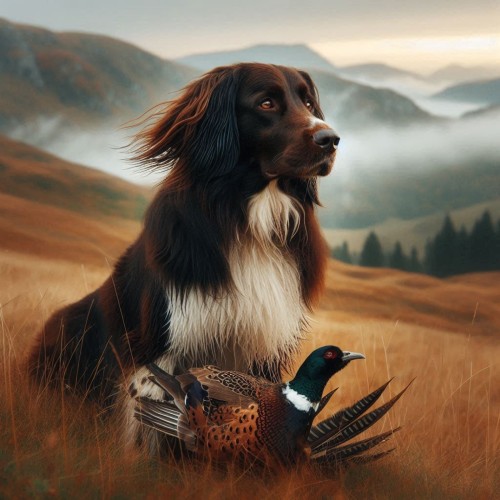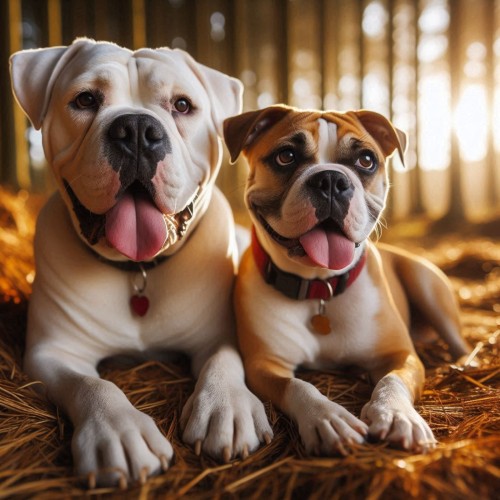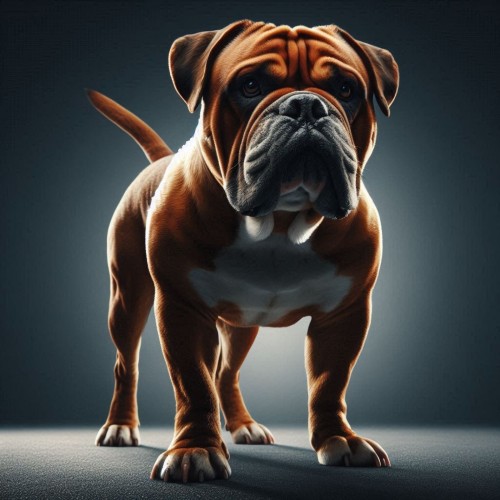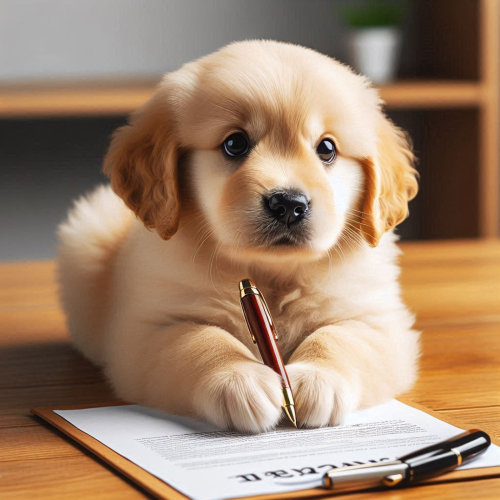The Appalachian Greyhound, also known as the Appalachian Whippet, is a lesser-known breed that has its roots in the Appalachian region of the United States. This breed is known for its agility, speed, and gentle temperament. Here's a detailed profile of the Appalachian Greyhound: Appearance - Size: Medium-sized dog, typically weighing between 45-65 pounds. - Height: Stands about 24-28 inches tall at the shoulder. - Coat: Short, smooth, and dense coat that comes in various colors including black, blue, fawn, red, and brindle. - Build: Sleek and athletic with a narrow, aerodynamic skull and a deep chest, similar to other sighthounds. Temperament - Personality: Gentle, affectionate, and friendly. They are known to be good with children and other pets. - Energy Level: High energy, requiring regular exercise to keep them happy and healthy. They enjoy running and playing in open spaces. - Intelligence: Intelligent and quick learners, making them relatively easy to train. - Socialization: They are social dogs that enjoy the company of their family and other dogs. Health - Lifespan: Typically lives between 10-14 years. - Common Health Issues: Generally healthy, but like other sighthounds, they can be prone to certain conditions such as hip dysplasia, bloat, and heart issues. Regular veterinary check-ups are recommended. Care - Grooming: Low-maintenance grooming needs. Regular brushing to remove loose hair and occasional baths are sufficient. - Exercise: Requires daily exercise, including long walks, runs, and playtime. They thrive in homes with access to a large, secure yard. - Diet: A balanced diet with high-quality dog food is essential. Portion control is important to prevent obesity. History - Origin: The breed originated in the Appalachian region of the United States. It was developed for hunting and as a companion dog. - Purpose: Initially bred for hunting small game due to their speed and agility. They have also been used as racing dogs and are now popular as family pets. Training - Training Needs: Respond well to positive reinforcement training methods. Early socialization and obedience training are recommended. - Activities: Excel in activities such as lure coursing, agility, and obedience competitions. Living Conditions - Environment: Adaptable to various living conditions but do best in homes with access to outdoor space. They can live in apartments if given enough exercise. - Family Compatibility: Great family dogs that bond closely with their owners. They are known for their loyalty and affectionate nature. The Appalachian Greyhound is a wonderful breed for those looking for an active, loving, and intelligent companion. With proper care, training, and socialization, they make excellent pets for families and individuals alike.
Origin and History The Large Munsterlander, also known as Großer Münsterländer Vorstehhund, originated in Germany, specifically in the Münsterland region of northern Westphalia. It was established as a separate breed in 1919 when breeders of black-and-white long-haired pointing dogs formed a breed society. The breed was officially recognized by the Fédération Cynologique Internationale in 1954. Physical Characteristics - Height: Males: 60-67 cm (24-26 in), Females: 58-65 cm (23-26 in) - Weight: Approximately 30 kg (65 lb) - Coat: Long, dense, and feathered, except on the head where the hair is short and smooth - Color: Predominantly black and white - Body: Muscular but not bulky, with a body length equal to its height at the withers - Gait: Fluid and elastic Temperament and Personality - Intelligence: Highly intelligent and trainable - Affectionate: Affectionate with family members and generally good with children - Energetic: Enjoys outdoor activities and is enthusiastic about play - Alertness: Tends to be alert and may react to strangers or potential threats - Social: Generally good with other dogs, but supervision is recommended Health and Care - Grooming: Requires regular grooming due to its long coat, including brushing to prevent matting and removing burrs and debris - Exercise: Needs regular exercise to maintain physical and mental health - Health Issues: Generally healthy, but like all breeds, may be prone to certain genetic health issues Training and Activities - Training: Responds well to standard training methods for basic obedience. Advanced training, especially for hunting, may benefit from professional help - Hunting: Excellent for pointing, tracking, and retrieving. Ideal for hunting birds such as grouse, woodcock, ducks, and geese - Companionship: Makes a loyal and loving companion for active families Conclusion The Large Munsterlander is a versatile and intelligent breed, well-suited for both hunting and companionship. With proper care, training, and exercise, it can be a wonderful addition to any family. Some images generated by my favorite AI engine.
American Bulldog and English Bulldog Mix Breed Profile The American Bulldog and English Bulldog mix, often referred to as the Amlish Bulldog, is a unique and lovable hybrid breed. This mix combines the best traits of both parent breeds, resulting in a dog that is both friendly and protective. Bred to combine the athleticism and working abilities of the venerable American Bulldog with the substance and tenacity of the English Bulldog to produce a dog that is hearty, strong, resilient, tenacious, and protective of its family but friendly to children and well-meaning adults. Appearance ● Size: Typically weighs between 70-120 pounds and stands 17-20 inches tall at the shoulder1. ● Coat: Short and smooth, requiring minimal grooming. They shed moderately, so regular brushing can help manage shedding1. ● Color: Can come in a variety of colors, including white, brindle, fawn, and combinations thereof. Temperament ● Personality: Amlish Bulldogs are known for their gentle and affectionate nature. They are playful and enjoy social interaction, making them excellent family pets1. ● Behavior: They can be stubborn at times, which can make training a bit challenging. Patience and consistent training methods are key1. ● Socialization: They generally get along well with other dogs and animals, especially if socialized early. They are also good with children but should be introduced to noisy environments gradually1. Health ● Common Issues: Like many bulldog breeds, Amlish Bulldogs can be prone to certain health issues, including: ○ Hip Dysplasia: A condition where the hip joint doesn't fit properly, leading to arthritis and pain. ○ Brachycephalic Syndrome: Due to their short snouts, they can have breathing difficulties. ○ Head Tremors: Involuntary shaking of the head, which is usually harmless but can be concerning1. ● Lifespan: They typically live between 10-15 years1. ● Veterinary Care: Regular checkups are essential to catch any potential health issues early on. Care and Maintenance ● Exercise: They require moderate exercise to keep them healthy and happy. Daily walks and playtime are sufficient1. ● Diet: A balanced diet tailored to their size and activity level is important. Consult with a veterinarian for specific dietary recommendations. ● Grooming: Their short coat is easy to maintain with regular brushing. Bathing should be done as needed1. Compatibility ● Family Life: Amlish Bulldogs are great family pets due to their affectionate and protective nature. They thrive on attention and love being part of family activities1. ● Living Conditions: They can adapt to various living environments, including apartments, as long as they get enough exercise and mental stimulation. The Amlish Bulldog is a wonderful companion for those who appreciate the unique qualities of both the American and English Bulldogs. With proper care, training, and socialization, they can be a loyal and loving addition to any family. Do you have any specific questions about this breed mix? Source(s) 1. American and English Bulldog Mix: Breeding, Care, and Health - Nahf 2. 47+ American Bulldog Mix Breeds - Alpha Paw 3. Amlish Bulldog Dog Breed: Info, Pictures, Care & More – Dogster 4. American Masti-Bull | Dog Breed Facts and Information- Wagwalking
This mixed breed combines the American Bulldog and the Dogue de Bordeaux, both of which have rich histories. The American Bulldog was originally used for farm work and hunting large prey, while the Dogue de Bordeaux was known for guarding and herding cattle (1,2). The American Bull Dogue De Bordeaux will have an appearance that is a mix between the American Bulldog and the Dogue De Bordeaux. The American Bull Dogue De Bordeaux will also take on some noticeable characteristics from the American Bulldog. This parent breed is strong and muscular with compact bodies. Their heads are also large and jaws are strong, with muscular necks that lead to deep and wide chests. The large and broad square shaped heads will have furrows that separate the round eyes. They also have tapering tails and thick, straight legs. Appearance: The American Bull Dogue De Bordeaux typically has a muscular and sturdy build, reflecting the physical traits of both parent breeds. They often have short earflaps, a broad and wrinkled head, and a powerful, wide muzzle. Their coat is usually short and can come in various shades of tan and brown (1,2). Size: ● Height: 22-27 inches ● Weight: 90-130 pounds Temperament: This breed is known for its loyalty and protective nature. They are generally calm around children but can be reserved around strangers. They are intelligent but can be stubborn, requiring consistent training and socialization from an early age (2,3). Exercise Needs: The American Bull Dogue De Bordeaux needs regular exercise to stay healthy and happy. Daily walks of at least 45 minutes are recommended. They enjoy slower-paced activities and can become winded easily due to their size2. Health Concerns: Common health issues include bloat, subvalvular aortic stenosis, and elbow dysplasia. Regular veterinary check-ups and a healthy diet are essential to manage these potential problems (1). Grooming: Their short coat is relatively low-maintenance, requiring regular brushing to keep it clean and healthy. They may drool, especially if they inherit the loose jowls of the Dogue de Bordeaux (1). Training: This breed is intelligent but can be strong-willed. Early and consistent training is crucial. They respond well to positive reinforcement techniques. Basic obedience classes and continued training into adulthood can help maintain good behavior (2). Living Conditions: The American Bull Dogue De Bordeaux can adapt to various living environments but does best in homes with space to move around. They can develop separation anxiety, so they are better suited for families where someone is often home (2). Suitability: This breed is not recommended for first-time dog owners due to their size, strength, and training needs. They are best suited for experienced dog owners who can provide the necessary training, exercise, and socialization (2). Would you like to know more about this breed or any other specific details? Source(s) 1. American Bull Dogue De Bordeaux | Wagwalking 2. American Bull Dogue De Bordeaux - DogTime 3. American Bull Dogue De Bordeaux Dog Breed Information - Dog Product Picker Images generated by my favorite AI engine.
When purchasing a puppy from a reputable breeder, the contracts they require you to sign serve several important purposes. Let’s delve into the details: Legal Protection: Most major life acquisitions involve legal contracts, and bringing home a purebred dog is no exception. These contracts are designed to protect both you and the breeder. While I can’t provide legal advice, it’s essential to understand that violating a properly executed contract could potentially lead to legal consequences. Philosophy and Expectations: Breeder contracts are not just about legalities; they also serve as an opportunity for breeders to share their philosophy, advice, and expectations. By signing a contract, you acknowledge the significant responsibility of caring for the puppy and commit to the terms outlined by the breeder. Common Elements in Breeder Contracts: Pet Quality vs. Show Quality: Contracts often distinguish between “pet quality” and “show quality” puppies. Pet-quality puppies are unlikely to become show dogs and are typically sold on limited registration. Show prospects may have more detailed contracts, specifying health screenings, show requirements, and breeding decisions. Basics Included: The contract usually includes: AKC registration number of the puppy. Sire and dam’s names and registration numbers. Purchase price. Health and Care: Contracts may cover health guarantees, vaccinations, spaying/neutering, and microchip information. They outline responsibilities related to the dog’s well-being. Show Expectations: For show prospects, contracts may detail when the breeder wants to see the puppy and who will handle its show career. If the dog is eventually bred, the contract specifies health screenings and other breeding-related details. Remember that each breeder’s contract is unique, reflecting their individual practices and values. Signing one is not just a formality; it’s a commitment to providing the best care for your new furry family member.
The Pros and Cons of Having Guardian Dogs at Home Having a guardian dog can enhance security and companionship, but it also comes with responsibilities. Evaluate your lifestyle, living space, and commitment level before welcoming a furry protector into your home. Each owner must consider their living situation and requirements for the dog and MUST know the true nature of the breed they choose. Having a #Guardian or #Livestock guardian is a big responsibility and is not to be taken lightly. Pros: Security and Protection: Guardian dogs serve as excellent protectors. Their presence deters intruders and provides a sense of safety for your family and property. They have keen instincts and can alert you to potential threats, whether it’s a stranger at the door or an unusual noise outside. Loyal Companionship: Guardian dogs often form strong bonds with their owners. Their loyalty and affection create a deep connection. They offer emotional support and can alleviate feelings of loneliness. Natural Alarm System: These dogs are like living burglar alarms. Their barking can alert you to any unusual activity, even when you’re asleep. Unlike electronic alarms, they don’t rely on electricity or Wi-Fi. Exercise and Outdoor Time: Owning a guardian dog encourages regular walks and outdoor activities. Their need for exercise keeps you active and promotes a healthier lifestyle. Reduced Stress and Anxiety: Petting and spending time with dogs can lower stress levels and boost mood. Guardian dogs provide emotional stability and a sense of purpose. Cons: Training and Socialization: Guardian dogs require proper training to differentiate between real threats and everyday situations. Without socialization, they may become overly protective or aggressive. Space and Exercise Needs: Large guardian breeds need ample space to move around. If you live in a small apartment or lack outdoor areas, owning such a dog can be challenging. Healthcare Costs: Guardian dogs, like all pets, need regular veterinary care. Medical expenses can add up, especially for larger breeds prone to specific health issues. Liability and Legal Considerations: If your guardian dog bites someone, you could face legal consequences. Liability insurance is essential to protect yourself and others. Time Commitment: Guardian dogs require attention, exercise, and mental stimulation. If you’re busy or travel frequently, consider the time commitment before getting one. Remember that each dog is unique, and your experience may vary based on the breed, individual temperament, and your own circumstances. Make an informed decision that aligns with your lifestyle and preferences. 🐾🏡









